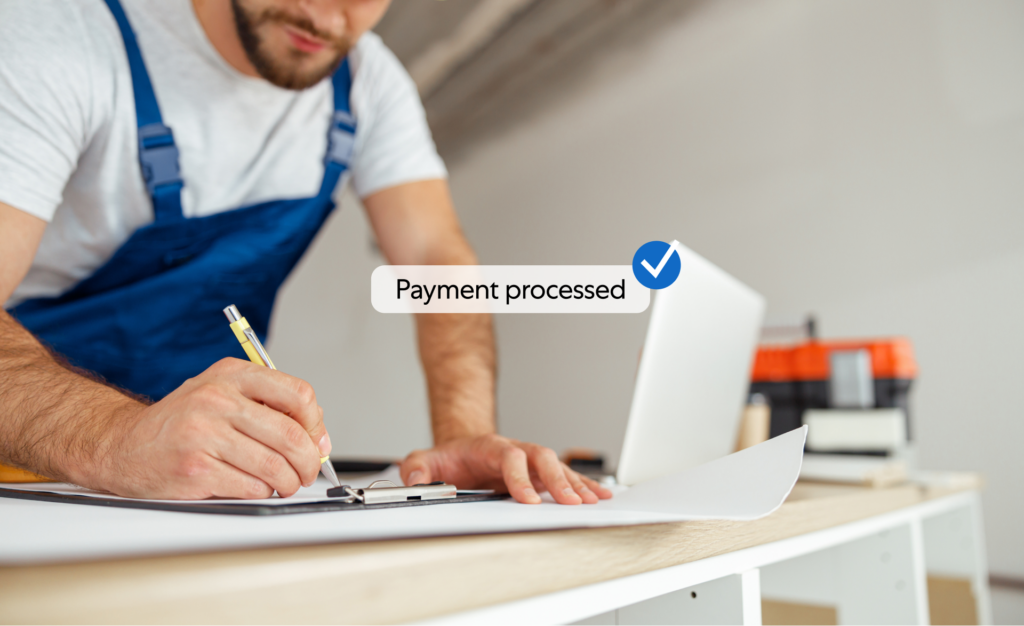In construction, streamlined billing and invoicing software is an essential piece of infrastructure to manage not only construction projects and change orders, but the overall health of your financial operations. When you move beyond spreadsheets to embrace end-to-end billing management platforms, you can handle the billing process effectively and have greater insights into your construction firm’s profitability.
Choosing the right billing software can dramatically improve cash flow, reduce admin, and improve the client experience. In this blog, we’re going to explore what construction companies need to know to select the appropriate billing software for their needs.
TL;DR
- Effective billing software is crucial for construction businesses, offering project-based tracking, seamless integrations, and automated invoicing to improve cash flow.
- Key features to prioritize include customizable invoice templates, progress billing capabilities, automated payment reminders, and robust reporting tools that provide insights into financial performance.
- Successful implementation requires careful selection based on your business size, comprehensive team training, thorough testing, and a strategic approach to transitioning to a new billing management platform.
Key Features to Look For in Contractor Billing Software
Project-based billing capabilities
Project-based billing and invoicing software allows contractors to track the different expenses that contribute to construction work across multiple jobs, including but not limited to labor, materials, and safety compliance. These pricing breakdowns promote transparency and trust with clients, while minimizing the likelihood of disputes due to misunderstandings over how costs are allocated across a project.
Integration with accounting and project management tools
Any billing software should seamlessly integrate with existing bookkeeping and project management tools via native plugins. This creates a unified system of real-time data sharing that removes manual entry and the need for spreadsheets. Common integrations with invoice apps to look out for are Zoho, Freshbooks, Xero, and QuickBooks.
Customizable invoicing options (e.g., branded templates)
Customizable invoice templates ensure that your business presents a cohesive brand identity across multiple touchpoints in the customer journey—especially in the post-purchase stage, where customers expect to receive the same treatment and care as they did during the works being completed. Custom invoices provide this consistency and ensure your business can present a professional image.
Support for progress billing and retainage
Progress billing is crucial in construction, as projects frequently span months at a time and require in-depth tracking to identify when certain project milestones are met. The ability to create invoices that reflect partial project completion and hold back a percentage of payment until milestones are reached improves financial management and communication with clients.
Automated payment reminders and follow-ups
Payment automation is a powerful tool for any business that wants to minimize time spent on admin and invoice management. Automated payment reminders and follow-ups ensure that construction businesses are constantly on top of outstanding invoices, without needing to dedicate hours to manual follow-up. You can design a sequence of email reminders to automatically send both before and after an invoice is due, ensuring customers are always in the loop with due dates.
Reporting and analytics tools for financial tracking
A strong payment analytics dashboard provides better insights into financial performance, such as invoice management, payments, and time tracking to help construction companies with data-driven decision-making concerning the invoicing process, what payment methods are accepted, pricing, and resource allocation.
How to Choose the Right Contractor Billing Software
Assess the size and complexity of your projects
If you’re a small business owner who’s managing a small number of projects or construction projects or doesn’t use subcontractors, your needs will be very different than a large construction firm that is running large commercial. Make sure that the software you select is capable of managing the scale of invoices and payment processing you need to operate effectively.
Determine your budget and software ROI
Before you get started, it’s important to know how much you have to support a new billing solution. Keep in mind that the cheapest option does not necessarily offer you the best value, depending on the payment options and invoicing features you need to operate effectively. Make sure you calculate the potential time and money saved against the cost of the software—especially on automation features that massively increase bandwidth.
Evaluating ease of use and support options
It doesn’t matter how powerful a piece of software is if it’s not user-friendly or intuitive for your team to use. In addition to functionality, it’s important to assess that a billing solution has robust customer support options, as well as training resources and tutorials to ensure an easy transition. Some providers may also offer an onboarding consultant to assist with this process and answer any questions.
Check for integrations with existing systems
It’s important to check that your current accounting software will integrate smoothly with your new billing solution, as well as any project management tools or business intelligence applications. It’s worth consulting API documentation to understand the complexity of an integration and whether you need any outside help to get systems connected.
Consider scalability for future business growth
If your business is on a sharper growth trajectory, make sure you choose a billing management platform that can grow with you. Factors to consider here are online payment processing volumes, credit cards and payment methods accepted, tracking payments, and expanded service offerings.
Benefits of Using Contractor Billing Software
Slow or inconsistent payment collection is one of the biggest reasons for poor cash flow within construction companies. By generating and sending invoices quickly, you can streamline the end-to-end billing process and reduce the time between project completion and receiving payment.
The reporting tools offered by modern billing software also provide much more in-depth insights into your overall financial performance, enabling you to identify patterns in which clients or types of construction projects are driving the best profitability for your business.
Moreover, human error is inevitable when in-house accounting teams are handling hundreds of invoices and due payments—especially for construction invoicing, which is more complex due to milestone-based payment collection. Using automated billing software significantly reduces the risk of missed expenses or incorrect billing rates. This accuracy not only protects your bottom line but also protects your reputation with more robust workflows. When invoices are detailed, timely, and easy to settle, client relationships will benefit.
Contractor Billing Software Implementation Tips
When implementing new software, especially when it affects critical infrastructure such as billing, it’s important to have a comprehensive strategy that ensures your construction business is prepared for any possible roadblocks:
Pre-implementation
Before you start migrating, conduct a thorough assessment of your current billing processes and identify the clear objectives for the new software i.e. replacing certain functions outright or complementing others.
Starting the process by identifying specific pain points in your existing workflow will make it easier to plan implementation and understand what you need to prioritize. Using these insights, you can create a detailed migration timeline.
Team training and preparation
Learning new software systems can be a bit overwhelming for teams, especially if they know another system inside and out. Make sure that you leave plenty of time to schedule comprehensive training sessions for all team members, where you can address any questions or concerns.
While your billing software should provide resources for you to leverage, it’s also a good idea to develop user guides and reference materials internally that reference specific use cases for your business.
Testing and troubleshooting
Before setting your new system live, you conduct rigorous system testing to identify any issues with payment gateways, test API points, and simulate various billing scenarios that your construction company will be using. Make sure you also develop a contingency plan for potential issues, including who to reach out to at your provider.
Final Words
Whether you’re a small general contractor or a large construction company working on commercial projects, investing in the best invoicing and billing platform is crucial for long-term success. Being able to send polished, professional invoices and handle payments promptly is not only good for cash flow and profitability; it bolsters the reputation of your business and improves the client experience.
However, it’s important to look beyond price to find the right billing software for your needs; understand what features you need to prioritize, the level of customer support on offer, and the integrations you need to find a platform that will support your business over the long term. Explore a free demo with Stax today to find out how we can help your contracting business!






